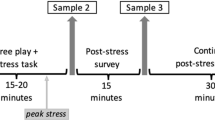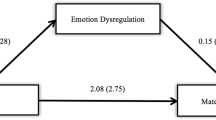Abstract
A history of childhood trauma is associated with increased risk for psychopathology and interpersonal difficulties in adulthood and, for those who have children, impairments in parenting and increased risk of negative outcomes in offspring. Physiological and behavioral mechanisms are poorly understood. In the current study, maternal history of childhood trauma was hypothesized to predict differences in maternal affect and HPA axis functioning. Mother-infant dyads (N = 255) were assessed at 6 months postpartum. Mothers were videotaped during a 3-min naturalistic interaction, and their behavior was coded for positive, neutral, and negative affect. Maternal salivary cortisol was measured six times across the study visit, which also included an infant stressor paradigm. Results showed that childhood trauma history predicted increased neutral affect and decreased mean cortisol in the mothers and that cortisol mediated the association between trauma history and maternal affect. Maternal depression was not associated with affective measures or cortisol. Results suggest that early childhood trauma may disrupt the development of the HPA axis, which in turn impairs affective expression during mother-infant interactions in postpartum women. Interventions aimed at treating psychiatric illness in postpartum women may benefit from specific components to assess and treat trauma-related symptoms and prevent secondary effects on parenting.
Similar content being viewed by others
References
Banyard VL (1997) The impact of childhood sexual abuse and family functioning on four dimensions of women’s later parenting. Child Abuse Negl 21:1095–1107
Banyard VL, Williams LM, Siegel JA (2003) The impact of complex trauma and depression on parenting: an exploration of mediating risk and protective factors. Child Maltreat 8:334–349
Barrett J, Fleming AS (2011) Annual research review: all mothers are not created equal: neural and psychobiological perspectives on mothering and the importance of individual differences. J Child Psychol Psychiatry 52:368–397
Beck AT, Steer RA, Garbin MG (1988) Psychometric properties of the Beck Depression Inventory: twenty-five years of evaluation. Clin Psychol Rev 8:77–100
Brand SR, Brennan PA, Newport DJ, Smith AK, Weiss T, Stowe ZN (2010) The impact of maternal childhood abuse on maternal and infant HPA axis function in the postpartum period. Psychoneuroendocrinology 35:686–693
Brennan PA, Pargas R, Walker EF, Green P, Newport DJ, Stowe Z (2008) Maternal depression and infant cortisol: influences of timing, comorbidity and treatment. J Child Psychol Psychiatry 49:1099–1107
Briere J (1992) Child abuse trauma: theory and treatment of the lasting effects. Sage, Thousand Oaks
Burke HM, Davis MC, Otte C, Mohr DC (2005) Depression and cortisol responses to psychological stress: a meta-analysis. Psychoneuroendocrinology 30:846–856
Champagne F, Meaney MJ (2001) Like mother, like daughter: evidence for non-genomic transmission of parental behavior and stress responsivity. In: Russell JA (ed.) Progress in Brain Research, Vol 133. Elsevier. pp 287–302
Dillon DG, Holmes AJ, Birk JL, Brooks N, Lyons-Ruth K, Pizzagalli DA (2009) Childhood adversity is associated with left basal ganglia dysfunction during reward anticipation in adulthood. Biol Psychiatry 66:206–213
Elhai JD, Franklin CL, Gray MJ (2008) The SCID PTSD module’s trauma screen: validity with two samples in detecting trauma history. Depress Anxiety 25:737–741
First MB, Spitzer RL, Gibbon M, Williams JBW (2002) Structured clinical interview for DSM-IV-TR axis I disorders, research version, Patientth edn. Biometrics Research, New York
Forman DR, O’Hara MW, Stuart S, Gorman LL, Larsen KE, Coy KC (2007) Effective treatment for postpartum depression is not sufficient to improve the developing mother–child relationship. Dev Psychopathol 19:585–602
Franklin CL, Sheeran T, Zimmerman M (2002) Screening for trauma histories, posttraumatic stress disorder (PTSD), and subthreshold PTSD in psychiatric outpatients. Psychol Assess 14:467–471
Gil E (1988) Treatment of adult survivors of childhood abuse: launch press. Walnut Creek, CA
Gonzalez A, Jenkins JM, Steiner M, Fleming AS (2009) The relation between early life adversity, cortisol awakening response and diurnal salivary cortisol levels in postpartum women. Psychoneuroendocrinology 34:76–86
Gonzalez A, Jenkins JM, Steiner M, Fleming AS (2012) Maternal early life experiences and parenting: the mediating role of cortisol and executive function. J Am Acad Child Adolesc Psychiatry 51:673–682
Heim C, Newport DJ, Heit S et al (2000) Pituitary-adrenal and autonomic responses to stress in women after sexual and physical abuse in childhood. J Am Med Assoc 284:592–597
Johnson KC, Brennan PA, Stowe ZN, Leibenluft E, Newport DJ (2014) Physiological regulation in infants of women with a mood disorder: examining associations with maternal symptoms and stress. J Child Psychol Psychiatry 55:191–198
Krpan KM, Coombs R, Zinga D, Steiner M, Fleming AS (2005) Experiential and hormonal correlates of maternal behavior in teen and adult mothers. Horm Behav 47:112–122
Lutenbacher M, Hall LA (1998) The effects of maternal psychosocial factors on parenting attitudes of low-income, single mothers with young children. Nurs Res 47:25–34
Lyons-Ruth K, Block D (1996) The disturbed caregiving system: relations among childhood trauma, maternal caregiving, and infant affect and attachment. Infant Mental Health J 17:257–275
Marx BP, Sloan DM (2002) The role of emotion in the psychological functioning of adult survivors of childhood sexual abuse. Behav Ther 33:563–577
Meewisse ML, Reitsma JB, de Vries GJ, Gersons BP, Olff M (2007) Cortisol and post-traumatic stress disorder in adults: Systematic review and meta-analysis. Br J Psychiatry 191:387–392
Mills-Koonce WR, Propper C, Gariepy JL et al (2009) Psychophysiological correlates of parenting behavior in mothers of young children. Dev Psychobiol 51:650–661
Moehler E, Biringen Z, Poustka L (2007) Emotional availability in a sample of mothers with a history of abuse. Am J Orthopsychiatry 77:624–628
Muzik M, Marcus SM, Flynn HA (2009) Psychotherapeutic treatment options for perinatal depression: emphasis on maternal-infant dyadic outcomes. J Clin Psychiatry 70:1318–9
Muzik M, Bocknek E, Broderick A et al (2013) Mother–infant bonding impairment across the first 6 months postpartum: the primacy of psychopathology in women with childhood abuse and neglect histories. Arch Womens Ment Health 16:29–38
Preacher K, Hayes A (2008) Asymptotic and resampling strategies for assessing and comparing indirect effects in multiple mediator models. Behav Res Methods 40:879–891
Roberts R, O’Connor T, Dunn J, Golding J (2004) The effects of child sexual abuse in later family life; mental health, parenting and adjustment of offspring. Child Abuse Negl 28:525–545
Schechter DS, Zeanah CH Jr, Myers MM et al (2004) Psychobiological dysregulation in violence-exposed mothers: salivary cortisol of mothers with very young children pre- and post-separation stress. Bull Menn Clin 68:319–336
Seng JS, Sperlich M, Low LK, Ronis DL, Muzik M, Liberzon I (2013) Childhood abuse history, posttraumatic stress disorder, postpartum mental health, and bonding: a prospective cohort study. J Midwifery Womens Health 58:57–68
Zuravin SJ, Fontanella C (1999) Parenting behaviors and perceived parenting competence of child sexual abuse survivors. Child Abuse Negl 23:623–632
Author information
Authors and Affiliations
Corresponding author
Rights and permissions
About this article
Cite this article
Juul, S.H., Hendrix, C., Robinson, B. et al. Maternal early-life trauma and affective parenting style: the mediating role of HPA-axis function. Arch Womens Ment Health 19, 17–23 (2016). https://doi.org/10.1007/s00737-015-0528-x
Received:
Accepted:
Published:
Issue Date:
DOI: https://doi.org/10.1007/s00737-015-0528-x




